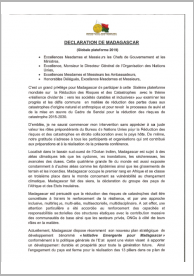
An Official Statement made by Mr Mamy Nirina Razakanaivo, at the sixth session of the Global Platform for Disaster Risk Reduction, May 2019.
The following is a list of all conten labeled as "Other"

An Official Statement made by Mr Mamy Nirina Razakanaivo, at the sixth session of the Global Platform for Disaster Risk Reduction, May 2019.
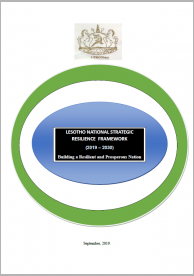
The Government has developed the National Resilience Strategic Framework (NRSF) to enable it to guide, coordinate and lead the process of resilience building in the country to ensure that Lesotho find a durable solution to address the multi-faceted challenges posed by climate induced shocks and stresses.
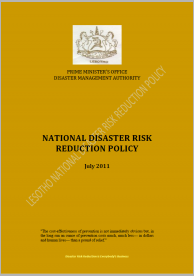
The purpose of national disaster risk reduction policy is to provide a framework for effective planning and implementation of disaster risk reduction in Lesotho. More than 90 percent of disasters in Lesotho are related to climatic changes.

This plan was established as a response to the impacts predicted due to the El Niño phenomenon (2015-2016). The overall objective of the National Response plan is to mount a timely, consistent, effective and coordinated response to save lives, property and livelihoods for the affected communities. The specific goals are to:
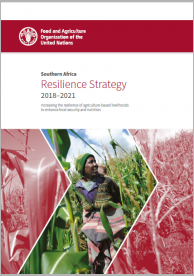
This Strategy aims to increase the resilience of agricultural livelihoods to contribute to enhanced food security and nutrition in Southern Africa through multisectoral, multi-hazard and multistakeholder consultations and joint interventions.
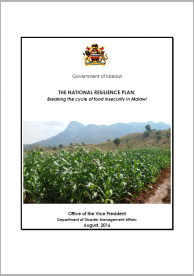
The broad objective of the plan is to help make Malawi resilient to disasters and break the cycle of food insecurity.
To achieve this, the following specific objectives will be pursued:

The INFORM initiative began in 2012 as a convergence of interests of UN agencies, donors, NGOs and research institutions to establish a common evidence-base for global humanitarian risk analysis.

The extent to which prevention, coping and adaptation differ from country to country is illustrated by this World Risk Report. With the World Risk Index, it provides an analysis of disaster risks worldwide and indicates which countries are in the greatest need to strengthen measures for coping with and adapting to extreme natural events.

This is the third consecutive year that CARE publishes its report “Suffering In Silence”. It serves as a call for the global community to speak up for people in crises who are otherwise forgotten and to help them overcome hardship.